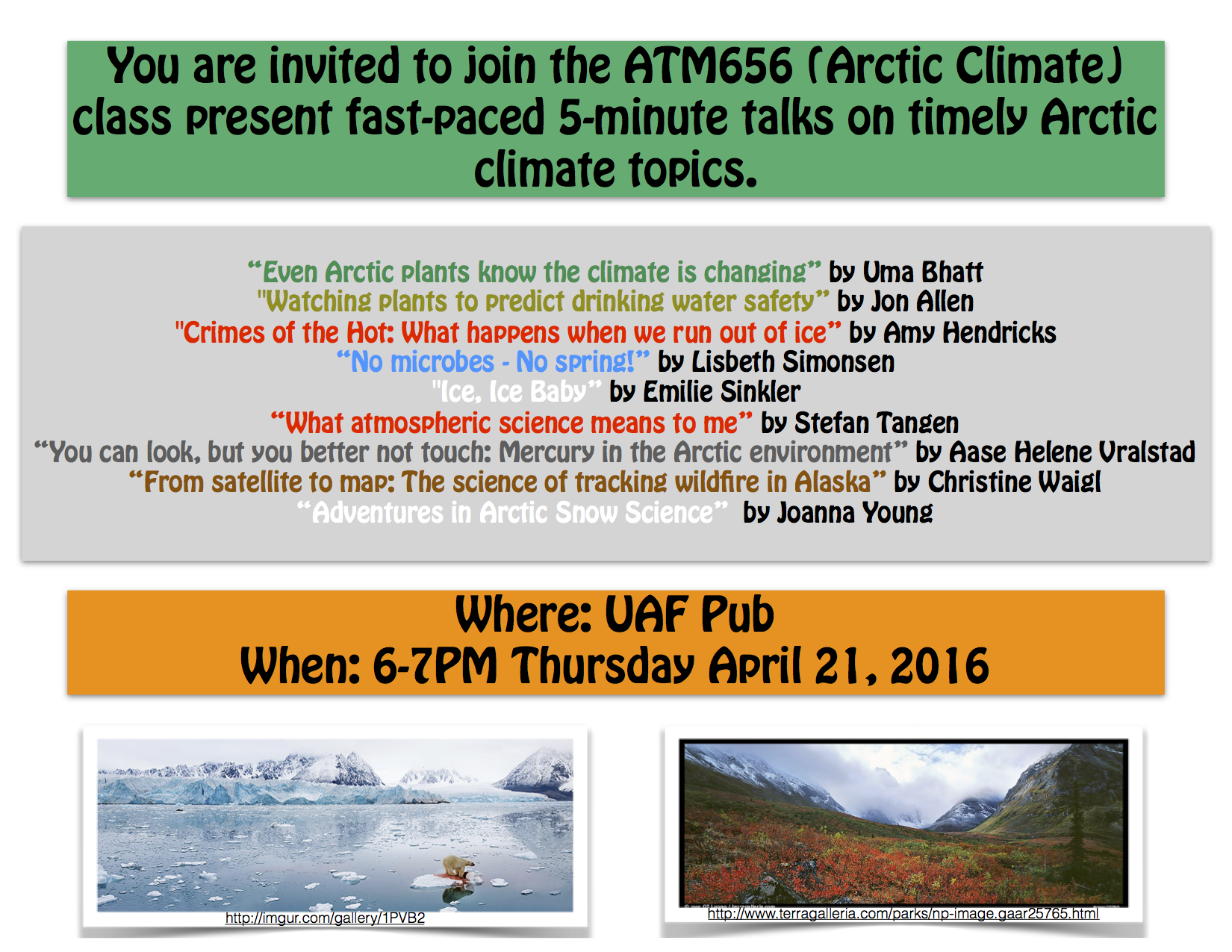Climate and Climate Change: Focus on the
Arctic
ATM 456/656 (3 credits)
University of Alaska Fairbanks
Spring 2016 (Jan.-May. 2016)
9:45-11:15 AM Tues-Thurs (Murie 230)
Course Syllabus (Last Edited: 24Jan2016, final syllabus attached)
syllabus, available here

Instructors:
Dr. Uma Bhatt,
Atmospheric Sciences, 307 IARC, Phone: 474-2662, usbhatt@alaska.edu, office
hours TH 11:15-noon or by appointment
Meeting time and location: Course meets 3
hours per week: 9:45-11:15AM on TH in Murie 230.
Course Description: This
class explores a holistic view of the Arctic climate system. Topics will cover the following components of the Arctic climate system.
There will be some flexibility depending on which topics students choose for
their projects. We will regularly spend time sharing news about climate and
share sources of information.
Course
Prerequisites: Graduate or senior standing in
Natural Sciences or instructor’s permission.
Course
Objectives: Students will gain a thorough
understanding of Arctic climate, it’s key components and how they influence
each other.
Instructional / Teaching Methods: This is a lecture/discussion course with mixed
activities. Discussion sessions require summary and discussion of assigned
readings from the current scientific literature.
Required
Texts:
·
The Arctic Climate System (Cambridge Atmospheric and Space
Science Series)
Jul 21, 2014, by
Mark C. Serreze and Roger G. Barry
·
University of the Arctic BCS 311: Land and Environments of
the Circumpolar World Module 7: Climate Change, Developed by D Boone and US Bhatt,
download from my web page at: http://www2.gi.alaska.edu/~bhatt/publications/BCS311Boone_Bhatt_2013.pdf.
Other Useful Texts:
·
Arctic Climate Change: The ACSYS Decade and Beyond (Atmospheric and Oceanographic Sciences Library)
(Volume 43) (2014) Edited by Peter Lemke and Hans-Werner
Jacobi
·
Global Physical Climatology (The International Geophysics Series, Vol 56) by Dennis
Hartmann, Academic Press, 1994, ISBN: 012328530-5.
·
IPCC Report: Climate Change 2007: The Scientific Basis, downloadable from the www for free. This is a good
reference if you are looking for some specific information.
Numerous climate books are on
reserve at the Geophysical Institute Library in the Akasofu Building (ground
floor level). ‘Arctic Climate Change: The ACSYS
Decade and Beyond’ is on reserve at Rasmuson Library.
Student
Learning Outcomes:
Students who are successful in this
class will learn these things:
·
They will gain a
basic understanding of how the atmosphere, ocean, cryosphere, and biosphere interact.
·
They will become
familiar with the basic concepts of climate dynamics including: global energy
balance, surface energy balance, hydrological cycle, atmospheric and oceanic
general circulation as related to climate, past climate, climate feedbacks, climate
models, and natural and anthropogenic climate variability/change.
By the end of this class, students will:
·
Be able to read
journal articles in the mainstream climate scientific literature.
·
Be able to critically
discuss current Arctic climate-change issues.
·
Apply concepts
from this class to their own research where applicable (Pass comprehensive exam
in Climate for ATM Ph.D. program
Course
Plan:
There will be 1.5-hour meetings
on Tuesday and Thursday. The time will be broken up into lectures, discussion,
and activities. Several quizzes will gauge student progress. There is a midterm
exam, a final exam, and a final project. Class attendance and participation are
essential.
Detailed Course
Calendar: (Instructor
keeps the option to alter this plan)
Week
|
Date
|
Class topic
|
Week 1
|
(1/14/2016)
Thursday
|
Class 1: Introduction and Basic Arctic
|
Week 2
|
(1/19/2016)
Tuesday
|
Class 2: Basic Climate of Arctic
|
(1/21/2016)
Thursday
|
Class 3: Basic radiation principles
|
|
Week 3
|
(1/26/2016)
Tuesday
|
Class 4: Earth and Arctic energy budget
|
(1/28/2016)
Thursday
|
Class 5: Atmospheric circulation and modes of
variability
|
|
Week 4
|
(2/2/2016)
Tuesday
|
Class 6: Atmospheric Circulation and modes of
variability
|
(2/4/2016)
Thursday
|
Class 7: Surface energy budget wrt snow and ice
|
|
Week 5
|
(2/9/2016)
Tuesday
|
Class 8: Surface energy budget wrt
snow and ice
|
(2/11/2016)
Thursday
|
Class 9: Climate feedbacks
|
|
Week 6
|
(2/16/2016)
Tuesday
|
Class 10: Precipitation and
Arctic hydrology
|
(2/18/2016)
Thursday
|
Class 11: Precipitation and
Arctic hydrology
|
|
Week 7
|
(2/23/2016)
Tuesday
|
Class 12: Arctic sea
ice-ocean-climate interactions
|
(2/25/2016)
Thursday
|
Class 13: Climate regimes of
the Arctic
|
|
Week 8
|
(3/1/2016)
Tuesday
|
Class 14: Open topics/catch up
|
(3/3/2016)
Thursday
|
Class 15: Open topics/catch up
|
|
Week 9
|
(3/8/2016)
Tuesday
|
Class 16: Midterm Exam
|
(3/12/2016)
Thursday
|
Class 17: Modeling
of the Arctic system
|
|
SPRING
BREAK WEEK
|
||
Week 10
|
(3/22/2016)
Tuesday
|
Class 18: Modeling of the Arctic system
|
(3/24/2016)
Thursday
|
Class 19: Modeling of the Arctic system
|
|
Week 11
|
(3/29/2016)
Tuesday
|
Class 20: Arctic Oceanography
|
(3/31/2016)
Thursday
|
Class 21: Arctic
Oceanography
|
|
Week 12
|
(4/5/2016)
Tuesday
|
Class 22: Marine Ecosystem
|
(4/7/2016)
Thursday
|
Class 23: Terrestrial Ecosystem
|
|
Week 13
|
(4/12/2016)
Tuesday
|
Class 24: Glaciers, ice sheets and the
consequence of a warming climate
|
(4/14/2016)
|
Class 25: Ignite
Presentations, Alaska weather/climate
|
|
Week 14
|
(4/19/2016)
Tuesday
|
Class 26: Alaska weather/climate
|
(4/21/2016)
Thursday
|
Class 27: Future of the Arctic
|
|
Week 15
|
(4/26/2016)
Tuesday
|
Class 28: Final Student Presentations
|
(4/28/2016)
Thursday
|
Class 29: Final Student Presentations
|
|
Finals Week
|
(5/8/2016)
Friday
|
Final Exam
8-10AM
|
Grading Scheme Exams,
Assignments and Grading
Component
|
Undergraduate
|
Graduate
|
Semester long evaluation
activities
|
||
Class participation
|
10%
|
10%
|
Homework
|
10%
|
10%
|
Pop Quizzes
|
5%
|
5%
|
Paper Discussion/Summary
|
10%
|
10%
|
Single event evaluation activities
|
||
Exam 1 (Mar 8, 2016)
|
25%
|
20%
|
Exam Final (May 8, 2016)
|
15%
|
15%
|
Ignite presentation
|
5%
|
5%
|
Semester
Project
|
20%
|
25%
|